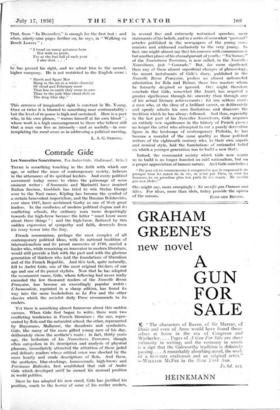Comrade Gide Les Nouvelles Nourritures. Par Andr6 Gide. (Gallimard. 10
fro.) THERE is something touching in the faith with which our age, or rather the mass of contemporary society, believes in the utterances of its spiritual leaders. And every political movement today seems to claim the patronage of some eminent writer : d'Annunzio and Marinetti have inspired Italian fascism, GoebbeLs has tried to win Stefan George over to the Nazi cause, Kipling has become the symbol of a certain benevolent imperialism, and the Russian Bolshevists, ever since 1917, have acclaimed Gorky as one of their great leaders. In the confusion of modern political dogma and its conflicting schools, the ordinary man turns despairingly towards the high-brow because the latter " must know more about these things " ; and the high-brow, flattered by this sudden expression of sympathy and faith, descends from his ivory tower into the fray.
French communism, perhaps the most complex of all contemporary political ideas, with its national tradition of internationalism and its proud memories of 1789, needed a leader who, while remaining an innovator in modern literature, would still provide a link with the past and with the glorious generation of thinkers who laid the foundations of liberalism and of the French Republie. And this task, quite naturally, fell to Andre Gide, one of the most original thinkers of our age and one of its purest stylists. Now that he has adopted the communist cause, Gide, whose following had never really exceeded the few thousand readers of the Nouvelle Revue Franfaise, has become an exceedingly popular writer : L'Immoraliste, reprinted in a cheap edition, has found its way into the same bookshelves as Le Feu and the other classics which the socialist daily Press recommends to its readers.
Yet there is something almost humorous about this sudden success. When Gide first began to write, there were two conflicting tendencies in French literature ; the one, repre- sented by Zola and the naturalist school, the other, represented by Huysmans, Mallarme, the decedents and symbolists. Gide, like many of the more gifted young men of his day, deliberately chose the aesthete's route ; in fact, thirty years ago, the, hedonism of his Nourritures. ,Terresires, though often outspoken in its description and analysis of, physical pleasuxe, immediately attracted the attention of those jaded and delicate readers whose critical sense was shocked by the more hearty and crude descriptions of .Zola. And these, the aesthetes, blue-stockings, homosexuals, high-brows and Precieuses Ridicules, first established that cult of Andre Gide which developed until he earned his timisual position in world politics: Since he has adopted hiS new creed, Gide has justified his HEINEMANN
position, much to the horror of some of his earlier readers, in several fine and extremely restrained speeches, mere
statements of his beliefs, and in a series of somewhat "pastoral" articles published in the newspapers of the ynung.
=mists and addressed exclusively to the very Young. In fact, one might almost say that his concern with communism is
but another phase of his eternal pursuit of youth : "Na,hanaei" of the Nourritures Terreslres; is now called, in the .Noutyllc; Nourritures, just " Comrade." But, far more significant
than any of these almost superficial changes of phraseology,
the recent instalments of Gide's diary, published in the Nouvelle Revue Fran false, profess an almost unbounded admiration for Zola and Balzae, those two masters whoM he 'formerly despised or ignored. Orie might therefore conclude that Gide, somewhat like Arnie!, has acquired a greater significance through his sincerity than through, any
of his actual literary achievements : for one seldom meets a man who, at the Close of a brilliant career, so deliberately and openly admits his own limitations and disavows the tradition which he has alWays followed. And thus, especially
in the last part of his Nouvelles Nourritures, Gide acquires an entirely new significance in the history of French prose : no longer the artist who attempted to cut a purely decorative figure in the landscape of contemporary Philistia, he has become a moralist of the same quality as those polished writers of the eighteenth century who, in their own superb
and ironical style, laid the foundations of rationalist belief on which a younger generation was to build a new State.
Indeed, the communist society which Gide now wants us to build is no longer founded on cold rationalism, but on a proper appreciation of human nature. And Gide concludes :
"Du jour on tu commencoras ik comprendre que le responsable do presque tons lea maux do la vie, ce n'est pas Dieu, co sont lea hommes, tu ne.prendras plus ton parti de CC3 maux. Ne sacritie
pas aux idoles.' . .
One might say, more sweepingly : Ne sacrifie pas rhomme aux idies. For ideas, more than idols, today provide the opium














































 Previous page
Previous page